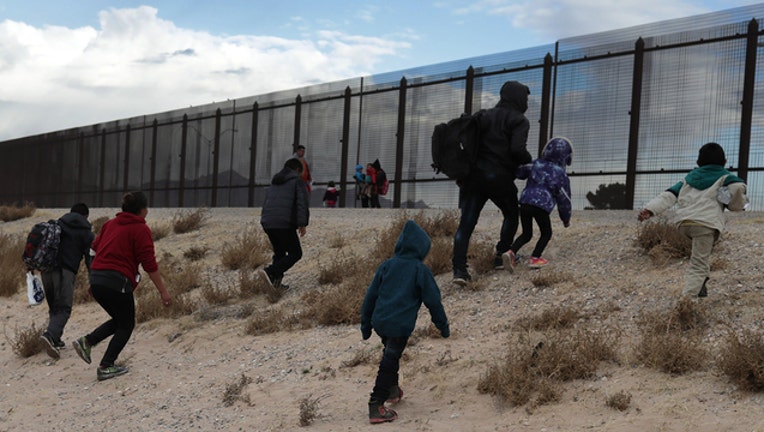Florida prepares for influx of immigrants from Mexico border

Central American immigrants approach the U.S.-Mexico border fence after crossing the Rio Grande from Mexico on February 01, 2019 in El Paso, Texas. (Photo by John Moore/Getty Images)
FORT LAUDERDALE, Fla. (AP) - Officials in South Florida say they are frantically preparing for an influx of immigrants being sent by the federal government as the number camped along the U.S. Mexico border grows rapidly.
Broward County Mayor Mark Bogen said Thursday that officials in Broward and neighboring Palm Beach County were alerted by the federal government that more than a 100 immigrants would be sent weekly to each of the two counties by plane starting in about two weeks. No shelters have been designated and no federal funding allotted to house, feed or guard them, Bogen said.
The Democratic mayor called it a "humanitarian crisis," and warned that many would likely become homeless.
Palm Beach County Sheriff Ric Bradshaw said he was notified of the plans by Miami-based office of the U.S. Border Patrol, and that a total of 1,000 people per month would be brought to the two counties from the El Paso, Texas, area. He said "family units" of migrants would be processed in both Florida counties, given a notice to appear in court and then released into the community.
"We don't know if that means a 15-year-old, a mother and a father, or a 5-year old and a mother ... we believe this is a public safety issue. What kind of health conditions do they have?"
The influx comes as a burgeoning number of Cubans are trying to get into the U.S. through the Mexican border, creating a massive backlog of people waiting on the Mexican side for months for their chance to apply for asylum. The recent surge has been propelled in part by loosened traveled restrictions in Central America and deteriorating living conditions in Cuba.
In the past, Cuban immigrants braved dangerous rafts in an attempt to make it to Florida where they were essentially allowed to stay if they made it to dry land, but the ""wet-foot, dry-foot" policy ended in 2017.
In the seven-month period from October through April, 4,737 Cubans without legal status entered the U.S. at crossings in Customs and Border Protection's El Paso field office, compared with 394 in the previous 12 months. Along the entire U.S.-Mexico border, 10,910 Cubans came through official crossings between October and April, versus 7,079 in the previous 12 months.
The Broward mayor warned that the influx would strain the county's social services and be harmful for immigrants stranded without money, housing or knowledge of the city. He said officials are reaching out to nonprofits and businesses to find resources and other support.
"If the President will not provide us with financial assistance to house and feed these people, he will be creating a homeless encampment," Bogen said. "I would suggest, that we bring them to the Trump hotels and ask the President to open his heart and home as well."
Administrators in Broward and Palm Beach planned to have a strategy session Thursday. Palm Beach County Mayor Mack Bernard said he planned to reach out to Gov. Ron DeSantis.
"If so many people are coming to Palm Beach County we may have to declare a national emergency," Bernard said. "The burden that will affect us in Palm Beach County will be humongous, specifically our school system."
The governor's office did not immediately respond to a request for comment.
María Rodriguez, executive director of Florida Immigration Coalition, said the group has been told of the relocation and is trying to come up with a plan.
"We will support and welcome refugees no matter where they come from," Rodriguez said. "This gimmick of flying them across the country is Trumpism fueling the xenophobic fire in a battleground state," she added.
The Associated Press contributed to this report.

